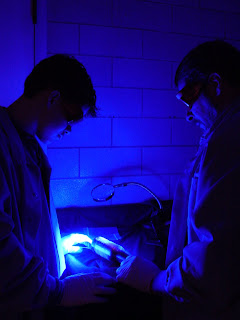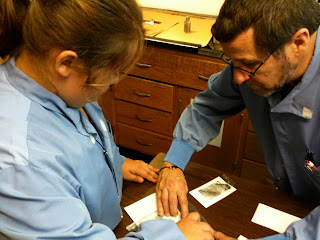
Many of those who know the intricate design of Kentucky’s Automated Fingerprint Identification Section (AFIS) have deemed it one of our agency’s best kept secrets. The complexity of what AFIS does and how the operations of the Kentucky State Police depend heavily on it, is often overlooked, even by most law enforcement personnel across the state of Kentucky. Television shows have made the phenomenon of forensics popular but sometimes unrealistic across the nation. However, latent fingerprinting plays a vital role in crime solving and has made tremendous advancements over the past few decades. Previously, the only way to store and classify criminal fingerprint cards was using the Henry System. However, due to continued technological improvements we are now able to store all fingerprint data, along with arrest descriptors, in digital form. This allows for millions of records to be stored in a small space and quickly retrieved. Since most prints are submitted electronically, via the LiveScan we are able to submit criminal arrests straight into the criminal history database. The AFIS system allows fingerprint analysts to perform thousands of comparisons in seconds to a databank of known prints. Fifty years ago an analyst could spend up to an hour making just one ten print comparison.
This section is responsible for supporting the State’s Criminal History Repository, maintaining the state’s criminal print database, and the development and identification of latent prints. Each process complements the other making them intermeshed and codependent. As a section, AFIS is broken down into three major groups: Tenprint Operations, Latent Operations, and AFIS System Administration. Tenprint Operations have the responsibility of overseeing entry and/or verification of the fingerprint records into the Automated Fingerprint Identification System. After a criminal booking is complete, prints submitted from the jail pass through a verification process that may require a tenprint operator to do a manual verification on the prints. This ensures that a new arrest is added to a criminals previous arrest record, or if necessary a new arrest record is created. The rolled fingerprint cards received via mail are always entered and verified by these operators. They also play a major role in the background check of thousands of individuals every year. Positions in the state of Kentucky that require a state or federal background check, via a set of fingerprints, will always require the tenprint operator’s assistance. Many criminals believe giving false information will allow them to deceive AFIS, but no matter the name, date of birth, or other demographic information the criminal gives at the time of arrest, AFIS will make a positive identification through fingerprint verification if a previous record exists. Many arrest records will have several aliases or different dates of birth, but the same prints. This is why AFIS is vital to background checks.
Occasionally a situation arises when an individual who has been previously arrested for sex offenses in Kentucky has seemingly “slipped” through the system into a position that poses a threat to the children they interact with. Those situations have spawned many to ask the question, “How does a previous sex offender get a job as a school teacher or as a bus driver?” The answers to questions like this lie within the scope of fingerprinting. To give a simple answer to the question, the individual was never fingerprinted on the previous sex offense. Without a set of fingerprints supporting an arrest, the arrest will never go into the fingerprint database. In short, if no prints are entered into the system, no confirmation will occur when entering the subject into the system. This link inspired recent legislation in Kentucky that mandated every jail across the state to fingerprint criminals before th

eir release. Every jail in the state has been provided the equipment needed to ensure that criminal fingerprints are properly submitted (i.e., LiveScan or ink and cards).
The latent section, which is often recognized for its ability to link a criminal to a crime through the development of latent prints, houses some of the most experienced latent examiners in the state. The average amount of years of experience in fingerprint examination and identification among the current five latent examiners is nearly 20 years. In a specialty profession like this, experience is vital to courtroom testimony and latent print comparison. These examiners process cases not only for the Kentucky State Police, but also for hundreds of other agencies across the state.
Fingerprints are the most commonly used forensic evidence for criminal casework worldwide. For this reason, each latent examiner will normally process hundreds of cases a year. The techniques they use vary from super glue and black powder processing to chemical and alternate light source processing. The Kentucky State Police uses the Latent Analyst to train cadets and other officers to develop latent prints in the field and can be called upon at any time for questions regarding latent processing. The role of a latent examiner does not only exist within the laboratory and classroom, but also in the field. Though many officers are trained in the science of latent print recovery, analysts who do it several times a day bring experience and refined technique to the case. As a result, Kentucky State Police (KSP) Latent Fingerprint Analysts are often called on by our agency or others in the event of a major crime scene or cases involving an unknown deceased.
In 2009, the KSP Latent Fingerprint Database contained 28,215 files and subsequently, there were 374 suspect identifications, 175 AFIS hits and 379 reverse search hits. A reverse search hit is one in which a previously unidentified latent fingerprint which were stored in an unsolved case database has been identified because the suspect has been arrested for another unrelated crime and their known fingerprints have been automatically compared with all the unsolved case fingerprints. So far in 2010, the AFIS Branch has reduced the backlog from 800 cases to now currently 130. The oldest cases they are currently working are approximately two weeks old.
At the root of Tenprint and Latent operations is System Administration, the most vital part of AFIS. The AFIS System is comprised of a very intricate computer system that runs over 120 LiveScans across the state, as well as eleven ID Stations, eleven Review Stations, and a Multi-Print Station. Consultants are accessible 24 hours a day, 7 days a week run this entire state system. It wasn’t until the last few decades that the science of fingerprints was able to benefit from the luxury of computers. The job of the System Analysts is to make sure all computer systems continue to run properly and are kept error free, as well as work with other computer systems analysts within the Records Branch to make sure all criminal arrest data flows easily. System Administration has been referred to as the “heart” of AFIS, and rightly so because without it Tenprint and Latent Operations would not be able to process, maintain, and utilize the millions of prints in the State of Kentucky’s Fingerprint Database.

 ble. While many agencies still offer the traditional ‘walk-in’ service that is $5.00, we are seeing that many customers prefer the online convenience of BuyCRASH that’s saves both time and gasoline.
ble. While many agencies still offer the traditional ‘walk-in’ service that is $5.00, we are seeing that many customers prefer the online convenience of BuyCRASH that’s saves both time and gasoline.


